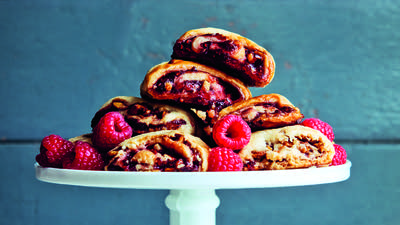
Some chefs are using Google+ Hangouts, which allow users to create their own virtual cooking demonstrations and broadcast them publicly. Ria Tobaccowala, a product marketing manager at Google, tells us about the future of the platform in the food community.
David Leite: A lot of people don’t know what Google+ Hangouts are. Can you explain?
Ria Tobaccowala: Google+ Hangouts are a feature of Google+, which is Google’s social platform. What Google+ Hangouts allows you to do is video chat with up to nine other people at once for free. You can also do public hangouts with up to nine people, which is actually broadcast publicly so others can watch on your Google+ profile or page and your YouTube channel.
DL: It does get recorded and then put on your YouTube channel?
RT: Yes, if you decide to do what we call a Hangout on air.
DL: So the entire world can see what you are doing?
RT: Yes.
DL: How did this move over to the food community? It’s very active there.
RT: Yes, it’s super active. In the early days, the summer of 2011, a lot of folks joined the platform and started experimenting -- that’s when the cooking community really started. A few early Google+ users were tinkering with Hangouts just because they loved to cook. Through them cooking with each other via Hangouts, it kind of created this new idea of a cooking demonstration.
Food bloggers and amateur chefs really took this Hangout technology and created this cooking show. What we’ve seen is that what a few early users did is now commonplace. Even better than that is major publications such as the The New York Times and Bon Appetit and well-known chefs such as Jamie Oliver started doing their own cooking demonstrations.
DL: They are doing them live and anyone in the world can ask Jamie Oliver a question?
RT: Anyone in the world.
DL: What is the impact of this? Suddenly we have thousands and thousands of people from Jamie Oliver all the way down to your next-door neighbor teaching each other how to cook.
RT: Right, the platform is elevating new voices that wouldn’t normally be heard in traditional media. In the music space, we saw someone like Justin Bieber, who was an Internet sensation before he went mainstream. We are coming pretty close to the point where the Justin Bieber in the cooking space might be discovered on Google+ and become the next great chef.
DL: Is there anyone out there that you think might be the new Justin Bieber of the food world?
RT: Sure, we’ve been noticing a few folks on Google+. One in particular is Larry Fournillier, who is from the Caribbean. He does a series of Caribbean cooking shows weekly. He has now over almost 1 million followers on the platform; it has been pretty amazing to see him grow his following and become a personality on the platform.
DL: I want you to jump 5 years into the future: Where do you think all of this will be -- Google+ Hangouts, teaching each other, communicating back-and-forth online?
RT: With the continued popularity and growth of web-based media, I think maybe in time Google+ may become the next Food Network. Instead of tuning into your TV to learn new recipes and techniques, you log onto your computer at any time and watch and join Hangouts and interact with others in real time. So we are really moving forward from sitting and watching something and just consuming regular content to being able to interact in real time with others around shared interests and passions.
DL: Do you think that there will be financial opportunities for people who are producing this content?
RT: Definitely. Similar to how you can monetize through advertising and subscription, the same will be true with Hangouts in the future. It will really take the imagination of those using the technology to make that happen.
DL: I think there will be a lot of producers out there thinking long and hard about how they can create their own Internet show.
Before you go...
Each week, The Splendid Table brings you stories that expand your world view, inspire you to try something new and show how food brings us together. We rely on you to do this. And, when you donate, you'll become a member of The Splendid Table Co-op. It's a community of like-minded individuals who love good food, good conversation and kitchen companionship. Splendid Table Co-op members will get exclusive content each month and have special opportunities for connecting with The Splendid Table team.
Donate today for as little as $5.00 a month. Your gift only takes a few minutes and has a lasting impact on The Splendid Table and you'll be welcomed into The Splendid Table Co-op.




